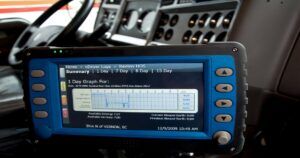
Federal rules adopted last year to require electronic logging devices in commercial trucks are expected to ensure that truck drivers take mandatory rest breaks and reduce truck accidents caused by drowsy driving.
The automated logging devices are expected to reduce the possibility that truck drivers would skip mandatory rest breaks and falsify their driving logs, which have previously been recorded manually. Drivers may skip rest breaks for a variety of reasons, including pressure by employers to meet unrealistic delivery schedules. Fatigued driving is a serious problem in the trucking industry and has been a top cause of accidents among long-haul commercial truckers.
In North Carolina, state statistics show more than 5,400 accidents involving tractor-trailers, semi-trailers and other heavy trucks in 2019. The truck accident lawyers at Hardison & Cochran in Raleigh, N.C., help people injured in truck accidents seek compensation for their medical bills and other losses. Everyone benefits from safer highways if electronic logging devices help America’s trucking industry comply with federal Hours of Service regulations.
What are Truckers’ Hours of Service and Electronic Logbooks?
In the trucking industry, the Hours of Service regulations govern the maximum amount of time a commercial truck driver is allowed to remain on duty, including driving time, and the number and length of rest periods that a driver must take during each work shift. Driving time is restricted to prevent long-haul truckers from being behind the wheel while they are sleepy or fatigued.
The Federal Motor Carrier Safety Administration (FMCSA), which regulates the trucking industry, adopted new HOS rules that took effect in September 2020. The new rules require truck drivers to use electronic logging devices to record time behind the wheel if they are otherwise required to prepare hours-of-service (HOS) records of duty status. The regulations also set logging device design standards and require the devices to be certified and registered with FMSCA.
An electronic logging device consists of software connected to a truck’s engine and other components to record the date and time of movement and miles driven, capture engine data, and keep dispatchers informed of the driver’s status in real-time. Drivers certify records, making any necessary annotations, and transmit them as required.
The FMCSA says that electronic logging devices are intended to create a safer work environment for commercial truck drivers and make it easier to accurately track and share data on driving and off-duty time. Manufacturers must certify that their devices meet the specifications set forth in federal rules in order for their devices to appear on the FMCSA list of self-certified ELDs.
Though the mandate has only been in effect since September 2020, electronic logging devices have had FMCSA approval and been available since December 2017. The FMCSA says hours of service violations found in driver inspections have dropped significantly since the rollout of ELDs.
How Can Electronic Logbooks Help Reduce Truck Accidents?
 Hours of service rules are complex, but essentially, they require truckers to take a 30-minute break after eight consecutive hours of driving. The rules limit the number of hours a trucker may drive in a shift and during a seven- or eight-day workweek. Limiting time behind the wheel is meant to reduce the number of drowsy truckers on the road and, therefore, reduce truck accidents.
Hours of service rules are complex, but essentially, they require truckers to take a 30-minute break after eight consecutive hours of driving. The rules limit the number of hours a trucker may drive in a shift and during a seven- or eight-day workweek. Limiting time behind the wheel is meant to reduce the number of drowsy truckers on the road and, therefore, reduce truck accidents.
Electronic logging devices are an enforcement tool. Because the devices automatically record the truck’s movement by time, date, and geographic location, it is more difficult for drivers to falsify their driving time or rest breaks. Some devices will automatically identify hours of service violations.
Previously, drivers were known to falsify handwritten logs to prevent the detection of hours of service violations. In 2014, a trucker who had been driving during most of 26 previous hours and had only rested for 3 1/2 to 5 1/5 hours crashed into two vehicles and killed the occupant of one. The trucker also had falsified his logs to conceal his hours-of-service violations, the FMCSA said.
If police find a driver in violation of an hours-of-service rule, they can force the driver and truck off of the road, until the driver accumulates enough off-duty time to return to compliance. They may also assess fines according to state and local laws. The FMCSA can find the driver or their employer anywhere from $1,000 to $16,000 per violation depending on the severity. If the violation involves a hazardous material, the fine can exceed $75,000.
The adoption of electronic logging devices also prevents motor carriers from pressuring drivers to drive while dangerously fatigued and then falsify the records. The design of the electronic logging devices allows only limited edits of a device’s record by the driver and the motor carrier’s agents. The original logging device record cannot be changed. As a result, motor carriers who push drivers to violate hours-of-service rules will leave an electronic trail of original and revised records. The driver certification of electronic logging device records also is intended, in part, to protect drivers from unilateral changes by trucking companies— a factor the FMCSA says drivers have identified as part of pressure they experience.
The Large Truck Crash Causation Study (LTCCS), a well-regarded national report, reported that 13 percent of drivers were considered to have been fatigued at the time of their crash. In 2018, the FMCSA found that 1.3% of drivers of large trucks in fatal crashes were asleep or fatigued at the time of the crash, down from 1.7% in 2016.
Contact a North Carolina Truck Accident Lawyer
Unfortunately, enforcement of hours of service rules only addresses one of several common causes of truck accidents. Our team of truck accident lawyers can investigate to identify the cause of a tractor-trailer accident in North Carolina that injured you or your loved one and help you seek compensation for your losses.
Call the experienced Raleigh truck accident lawyers at Hardison & Cochran toll-free at 800-434-8399 now or fill out our online contact form for a free initial consultation about how we can help you.




